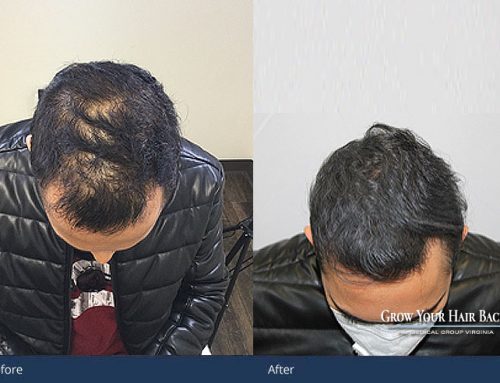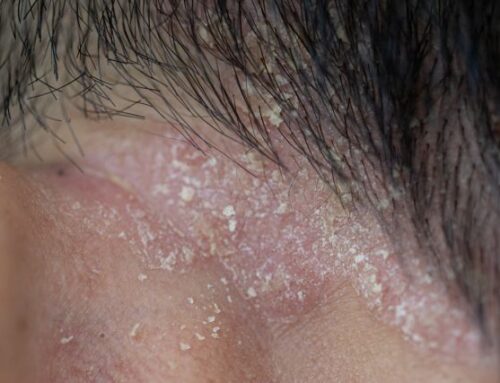The Rise of Early Hair Loss in Gen Z Men
Hair loss is no longer just a concern for older adults. Today, a growing number of young people are noticing early signs of hair thinning and balding. More specifically, hair loss in Gen Z men—those born between the late 1990s and early 2010s—is becoming increasingly common, sparking concern and confusion among young men in their teens and twenties.
At Grow Your Hair Back Hair Restoration Clinic in McLean, Virginia, we understand how troubling it can be to face hair loss at such a young age. The good news? You’re not alone, and there are highly effective ways to manage and reverse it—especially if you take action early.
Why Are Gen Z Men Losing Their Hair Earlier and Earlier?
Hair loss in Gen Z men isn’t just a social media trend—it’s a real and growing issue. More men are noticing receding hairlines, thinning crowns, and excessive shedding before they even turn 25. But what’s behind this earlier onset?

1. Genetics Still Play the Biggest Role
The most common cause of hair loss in men is androgenetic alopecia, or male pattern baldness. If your father, uncles, or grandfathers experienced early hair loss, you’re more likely to as well. However, genetics alone doesn’t explain the sharp rise among Gen Z men.
2. Increased Stress and Anxiety
Academic pressure, job insecurity, social media comparisons, and a fast-paced digital lifestyle have contributed to chronic stress—one of the top triggers of telogen effluvium, a temporary but significant type of hair loss.
3. Nutrient Deficiencies and Poor Diet
Many Gen Z diets rely on fast food and processed meals lacking essential nutrients like protein, iron, zinc, and biotin—causing hair follicles to weaken and shed prematurely.
4. Hormonal Imbalances
Weight changes, hormone-related conditions, and medications can lead to increased DHT, the hormone responsible for miniaturizing hair follicles in male pattern baldness.
5. Hair Damage from Styling and Harsh Products
Frequent bleaching, tight hairstyles, and hot tools can lead to traction alopecia or scalp inflammation—conditions that may cause permanent damage over time.
The Importance of Early Treatment
Addressing hair loss in Gen Z men early increases the likelihood of successful treatment. By taking action in your teens or twenties, you can preserve hair density, reverse thinning, and delay or avoid more invasive procedures later in life.
Clinical Treatments for Hair Loss in Gen Z Men
When it comes to hair loss in Gen Z men, early clinical intervention can make a significant difference. Two notable topical treatments have been shown to effectively slow down or even stop the progression of hair loss. These options work best when started in the early stages of thinning and can help preserve hair density over time.
- Finasteride (Propecia): A DHT-blocking oral medication proven to slow hair loss and support regrowth.
- Minoxidil (Rogaine): A topical treatment that increases scalp blood flow and stimulates hair follicles.
Low-Level Laser Therapy (LLLT)
LLLT is a non-invasive, drug-free option that uses therapeutic laser light to stimulate hair follicles and improve circulation. Available in clinics or through FDA-cleared at-home devices, LLLT is ideal for early-stage hair thinning and works well alongside other treatments.
Enhanced Plasma Therapy
This innovative treatment uses your own blood platelets, injected into thinning areas of the scalp to stimulate natural hair regrowth. Enhanced Plasma Therapy improves blood flow, revitalizes dormant follicles, and strengthens existing hair.
Hair Transplant Surgery (With a Word of Caution)
Advanced hair transplant procedures like Artas Robotic FUE hair transplants and Multi-Unit FUT hair transplantation offer permanent solutions for advanced hair loss. However, a word of caution for younger men:
Hair transplant surgery is not generally recommended for young men under 25. This is because your pattern and extent of hair loss are still developing. Individual hair loss patterns and rates vary widely. Some individuals may experience a more stable pattern of hair loss earlier, while others might continue to lose hair into their 30s, 40s or later. Transplanting hair too early can result in unnatural appearance or the need for additional surgeries later on.
At Grow Your Hair Back hair transplant clinic in McLean, Virginia, we carefully assess your hair loss progression and offer age-appropriate non-surgical alternatives when appropriate.
How Gen Z Men Can Protect and Improve Hair Health
- Eat nutrient-rich foods: Focus on proteins, omega-3s, leafy greens, and foods high in zinc, iron, and biotin.
- Manage stress: Practice mindfulness, physical activity, and relaxation techniques to regulate cortisol levels.
- Use gentle products: Choose sulfate- and paraben-free shampoos. Avoid excessive heat styling and aggressive brushing.
- Stay hydrated and get quality sleep: Both are critical for scalp circulation and cellular repair.
- Avoid tight hairstyles: Reduce tension on the scalp by skipping tight braids, buns, and ponytails.
Get Answers to Your Questions
Hair loss in Gen Z men is increasingly common, but with proactive care and expert guidance, it’s highly treatable. Whether you’re noticing early thinning or experiencing ongoing shedding, we’re here to help.
At Grow Your Hair Back Hair Restoration Clinic, we specialize in solutions tailored to young men—using the latest technology and a compassionate, personalized approach.
Don’t wait. If you’re experiencing hair loss, the best time to take action is now. Contact us today to schedule your consultation. We’re here to answer your questions, explore your options, and help you grow your confidence along with your hair.




